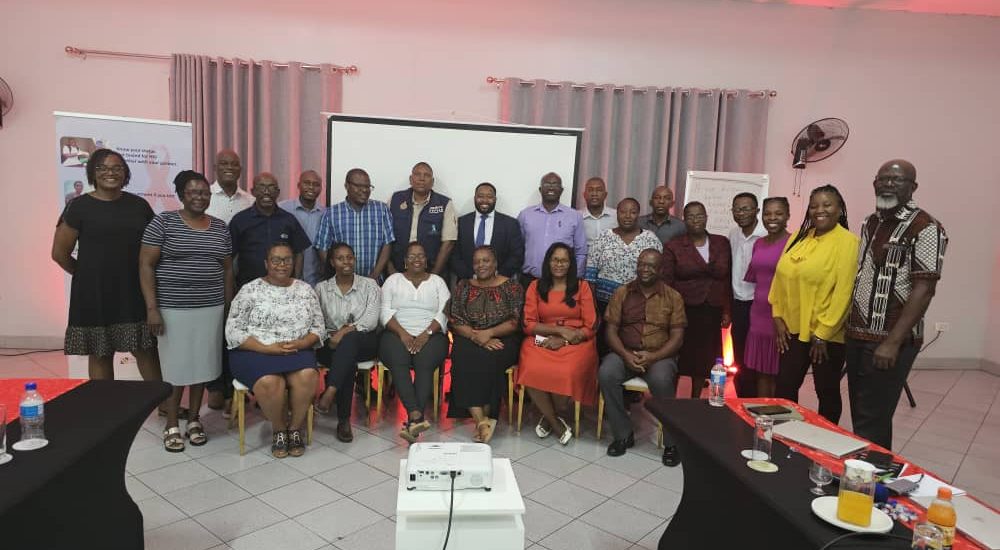With support from the U.S. President’s Emergency Plan for AIDS Relief (PEPFAR) through the Center for Disease Control and Prevention (CDC), Zim-TTECH is conducting a two-day Training of Trainers (TOT) workshop on child safeguarding to staff under the ZimPAAC consortium. The workshop is to ensure the organisations are compliant to global standards that call for the protection and creating of a safe environment for children in programme implementation. After the training, the participants are expected to cascade the training downstream to all staff.
What an eventful November we had, Catch all the updates by reading our newsletter,
We are so excited to be sharing the first ever monthly newsletter with you. Get a glimpse of what we have been upto the month of October 2022.
Zimbabwe Technical Assistance, Training and Education Center (Zim-TTECH) is the recipient of a new five-year PEPFAR award- Strengthening Epidemiology and Strategic Information grant through the Center for Disease Control (CDC). The award officially begins on 30th September 2022
The award will be implemented through the “Impilo” Electronic Health Record (EHR)/CBS program. The program aims to build the Ministry of Health and Child Care’s (MOHCC) capacity at the national, provincial, and district levels to collect key strategic information (SI) required to measure progress towards achieving epidemic control and generate a strong evidence base for informed program decision-making in Zimbabwe.
Zim-TTECH envisions universal access to safe, client-centered, and high-quality healthcare for all people while working to improve the health and well-being for all through the provision of technical assistance and direct service to the health sector, as well as strengthening healthcare worker skills to support the sustainability of health systems.
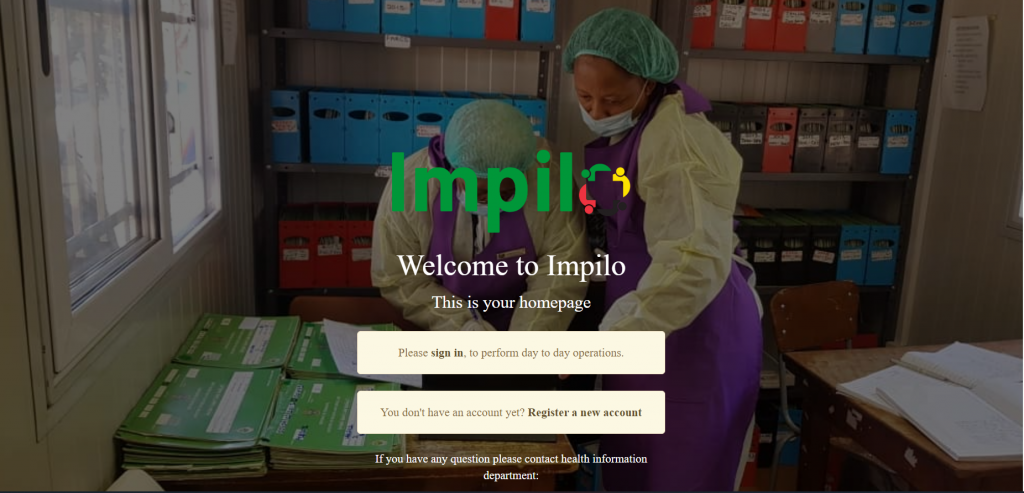
It is mid-afternoon and the bellowing sound of cows is heard in a distance. The scorching sun’s heat is unbearable and makes it very difficult to walk in the sandy soil of Bubi District in Matabeleland North province of Zimbabwe. Clouds of smoke can be seen from a distance signaling the preparation of midday meals. We walk into Thompson Maseko’s homestead in Vadala village. We go to the neatly thatched kitchen and announce our arrival.
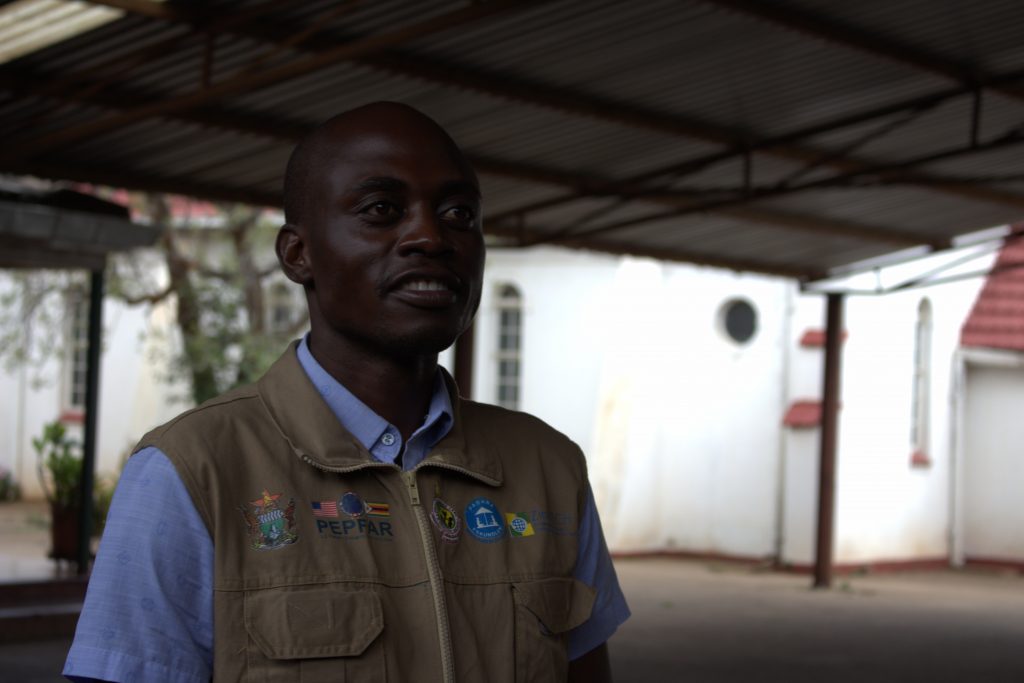
A lean, tall guy walks out followed by two little girls, the resemblance is out of this world, he certainly and without doubt, is the father. Maseko introduces himself to us and lets us know that he is the Padare Enkhundleni Men’s Forum on Gender Male Advocate in Vadala Village. We are excited because he is the one we have come to see.
Padare Enkhundlen Men’s forum on Gender is a movement of men advocating for gender justice in Zimbabwe and is one of the partners under the Zimbabwe Partnership to Accelerate AIDS Control (ZimPAAC) consortium.
The spicy aroma from the kitchen does not escape our nostrils and we hope to see his wife busy in the kitchen only to find out that he was the one doing the cooking for his young girls,
“My wife has gone to work and I am home with my daughters so I was preparing lunch for them,” he said. The look on his face does not show that he is doing something out of the ordinary, for him cooking for his daughters is as normal as any other house chore.
“As a male advocate in my community, I encourage men to challenge masculinity, there is nothing wrong with sharing house chores and helping around the house,” he sternly said.
While we are still doing the interview, Maseko excuses himself to go and serve his daughters food and we are glad to watch him do so. In 2020, He was crowned the best Male Advocate in Matabeleland North where he works with Zim-TTECH and Padare Enkundleni Men’s forum encouraging men to get circumcised and demystify myths around Patriarchy.
“I mainly do one on one interactions with men in my community and I work with my village traditional leadership to encourage men to get circumcised. So far, I have reached over 600 individuals in and around my community. In just a month I meet with around 60 men with whom I have conversations around male circumcision and HIV testing,”
“Now, I have frequent visitors who come to enquire and get insights, some of them I refer to the local clinic for further assistance. We have HIV self-test kits that we encourage people to use regularly,” highlighted Maseko.
“I have seen significant changes in my community since I started as a Male Advocate. I have seen men accompanying their wives to access health services. I have seen men help out with house chores. A lot of men in my community are now seeking health services. They no longer shun visiting health facilities and that is a good sign.” He said.
Male Advocates in Matabeleland North work with the Ministry of Health and Child Care through the Zimbabwe Partnership to Accelerate AIDS Control (ZimPAAC) consortium. Padare in Matebeleland North addresses social norms that promote patriarchal domination and all forms of abuse by men that leads to poor health-seeking behavior and gender-based violations. Male advocates work with other critical stakeholders such as National Aids Council and gender organizations to ensure a coordinated approach as well as ease of referrals. Padare engages men in the communities through safe space dialogues where men challenge harmful and toxic masculinities in an endeavour to create a gender-just society. Apart from mobilizing men for services such as Voluntary Medical Male Circumcision, sexually transmitted infections, and HIV testing services, Padare also supports health facilities with Anti-Retroviral Therapy defaulter tracking. This includes bringing back to care males that would have defaulted or deferred on ART due to different circumstances.
Through dialogues in COP20, male advocates have reached out to 95,729 men and boys since 2020 to date. These are men and boys that participated in the dialogues that were held in communities on social norms. Male advocates reached out to and referred for HTS services 36,596 men and boys. Under Voluntary Medical Male Circumcision (VMMC) a total of 2,0707 have been referred for VMMC. A total of 7722 males have been referred for STI screening and a total of 2900 male defaulters have been followed by male advocates while a total of 3,946 males were challenged to accompany their intimate partners for ANC visits.
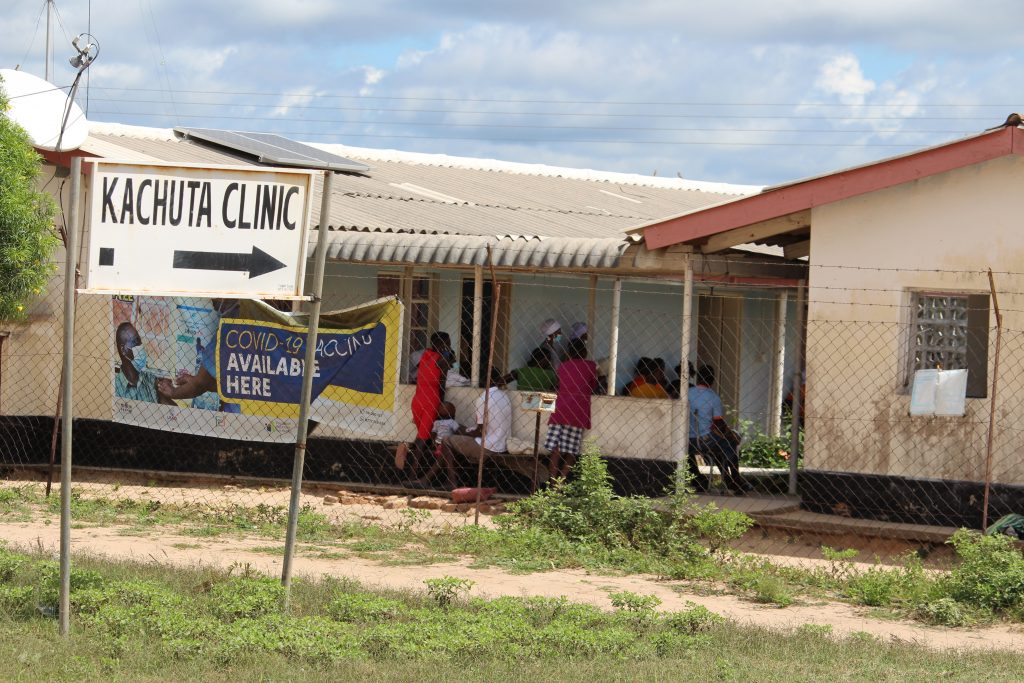
Located approximately 155 kilometres away from the Capital city, Harare, lies Guruve, one of the eight districts in the Mashonaland Central province of Zimbabwe. The district capital is the town of Guruve and around 25 kilometres away is Kachute Clinic where Zim-TTECH offers Technical assistance supporting the Ministry of Health and Child Care.
In a bid to improve viral load coverage, Zim-TTECH supports Quality Improvement initiatives to its DSD and TA sites. The Quality improvement team focuses on processes and systems, use of data to improve services, and use teams to ensure quality.
Kachuta Clinic has proved to be one facility that is doing well since the roll out of Clinic Lab Interface QI initiative, as the team has proved to be a force to reckon, with a well-documented QI corner in place with the run charts well plotted up to date with annotations.
“We have monthly team meetings, where we update each other on any issues arising during the course of that month, we set our targets and we do not work in silos. If one of us is not available then anyone among the team members can assist,” said Sister Zvidzayi Munyaradzi, the OI focal person.
These monthly meetings link and allow flow of information within the facility from the Testing area, OI desk and the Laboratory Department as well as allocation of roles and responsibilities.
It is during these meetings that the team, comprising the Nurse in charge, Primary Counsellor, OI Focal person, Primary care nurse and the Microscopist share information, responsibilities, check achievements, go over registers and note areas of collaboration. The NIC appoints one of the nurses to be the focal person of the OI/ART clinic.
Mr Mupezeni, the Microscopist highlighted how the rollout of CLI QI has assisted the facility as they are now able to book the clients in the appointment diary using code3, documentation of the Facility viral load register and transmittal register, identify clients who are due for Viral load sample collection as well use of the Vacutainer system on plasma collection,
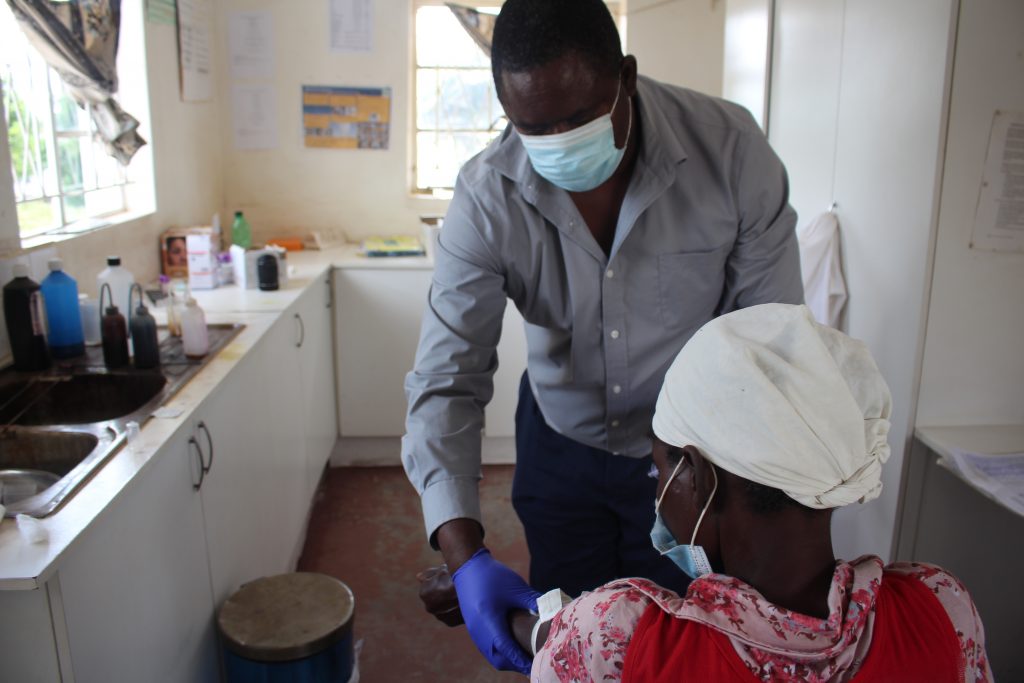
“It used to be difficult to track clients due for Viral load, but ever since we rolled out QI and adopted the cohort system it is now easy. We are now able to identify challenges and problems quickly as a team. As I chat to you right now, I can confidently say I can use the Vacutainer system for plasma collection after demonstration during CLI roll out,” said Mupezeni.
“We have clear follow up procedures, and we refer to our registers for any information needed. This is because our documentation in the registers has improved due to QI mentoring and support from the coaches,” he said.
“Drug pick up has also improved, if a client does not show up, we do follow up as this is easy to track in our registers. We have a clear appointment system in place which is very effective and a follow up of missing results tool is in place. For instance, when we send Viral load samples to the District hospital sometimes not all results are sent back to us, so we have a tool that we designed with client details that we will use to follow up on the missing results,” He said.
The Kachute team has proved to be effective as they do not work individually but as a team. This can be evident by the amount of time they have clients at the facility, they work swiftly together as a team and every team member is aware of what needs to be done and how. With walls amassed with charts and graphs, the clinic uses facility-level data to monitor the progress of the QI project using the plotted graphs.
“We do not encourage specialisation at this facility because what happens when the person specialising in a certain area is not around. We do not want to short-change our clients hence we encourage each team member to be and all-rounder,” said Sister Munyaradzi.
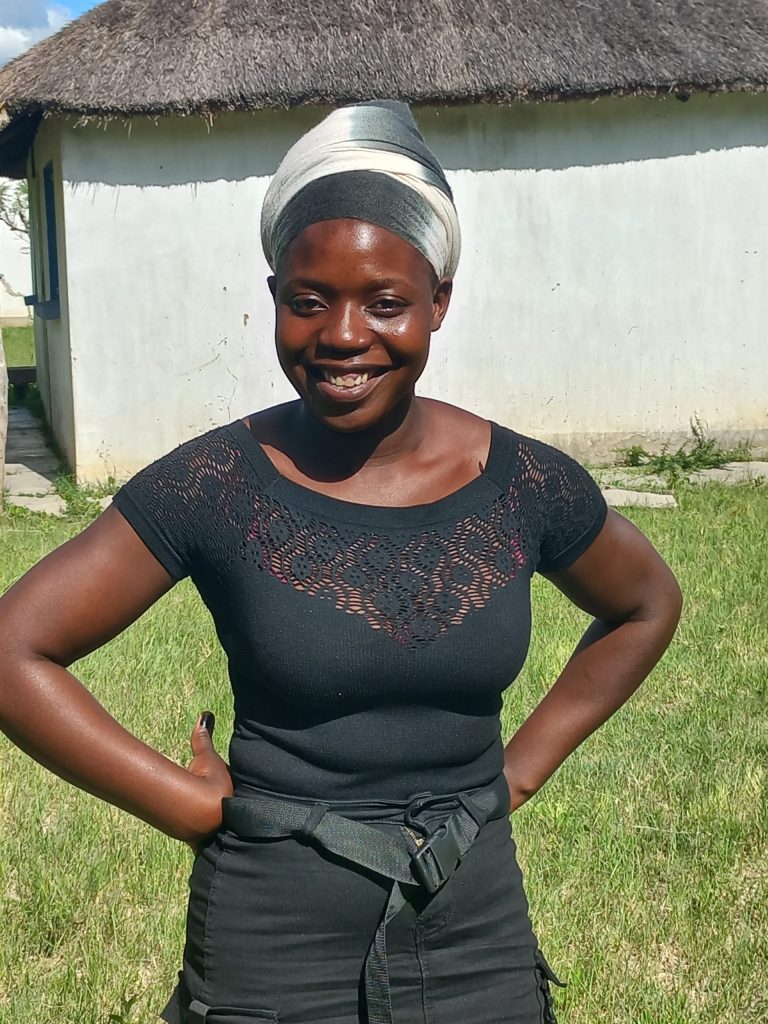
Located about 98 km north-west of Bulawayo, the second largest city of Zimbabwe, lies the Tsholotsho growthpoint The main economic activity in Tsholotsho is farming however the soils are bad for cultivation which then deprives young people in this area of economic activity in farming. Young people with no economic activity are at risk of contracting HIV and AIDS especially Adolescent girls and young women (AGYW). Petra Sibanda (22), one of the Community based facilitators of ward 3, Kopane village in Tsholotsho, is one of the many AGYW that the Determined, Resilient, Empowered, AIDS-free, Mentored and Safe (DREAMS) project has positively impacted in Matabeleland North province of Zimbabwe.
Petra who became a mother at 16, believes if she had gotten the information she got through the DREAMS project earlier she would have made better choices. After falling pregnant with no immediate plans to be parents, Petra and the father of the child panicked which resulted in the father refusing to be a part of the baby’s life,
“When I got pregnant, I did not have sufficient information on how to protect myself, we were young. It was not an easy pregnancy and having to do it alone was even harder,” she said.
After giving birth to her baby girl, Petra heard about the Dreams project from the Head nurse at the clinic in her village, she quickly applied for the Community based Facilitator role and was successful.
“The DREAMS project changed my life, now I know that I have the right to protect myself from unwanted pregnancies and contracting HIV, AIDS and STIs. I have insight as to how PreP works and with access to such information I can simply say I am empowered and no one can violate me,” said bright-eyed Petra.
Every Adolescent girl and young woman dreams of a future in which they are empowered and are able to pursue their dreams. Petra dreams of becoming an Accountant one day and as a CBF, she encourages AGYW to protect themselves and be empowered to reduce the risk of contracting HIV through Health4life sessions where they have youth friendly reproductive health sessions on condom use, Prep uptake, stigma and discrimination.
The DREAMS project has changed Petra’s life. She now lives a life of purpose and inspires other AGYW in her community to live a healthy and dignified life.
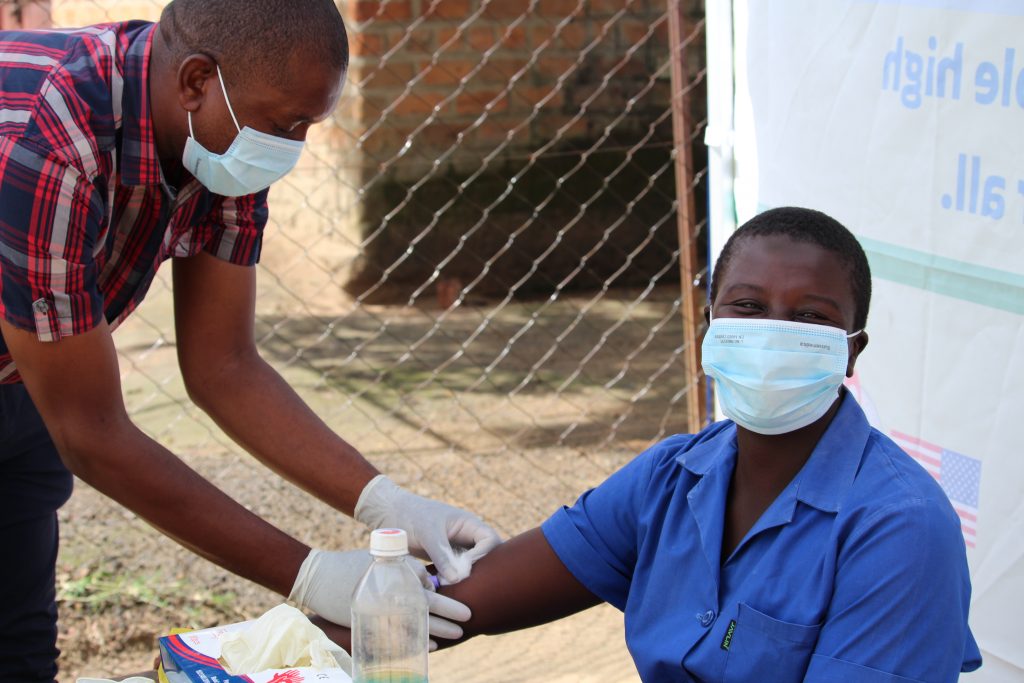
It was on the 5th of September 2017, in the evening, when Lucienne (41years) decided to administer an HIV self-test in the comfort of her home together with her husband. Like all the other days, after hectic farm work, Lucienne was tired and wanted to rest but after visiting her best friend who is the Village health worker who gave her an HIV self-test kit, she wanted to do the test that night and get it over and done with.
“I remember the day and time vividly, the 5th of September 2017, around 8 pm in the evening. 20 minutes later the results came in, and we were all HIV positive. We could not believe it at first. How can a self-test kit show that we were both positive? It could not be,” she said.
After a week of deep thinking and chatting to a close friend who advised her to visit the nearest clinic, Lucienne decided to do another test at the local Nyameni clinic in Marondera,
“My husband tagged along, though he was skeptical about it, we were both scared, but we had to be certain and sure of our HIV status. The results came and we were all HIV positive. That is when reality sunk in. We were so angry with each other at that moment,” she said.
“We were quickly initiated on ART. Back home, our Village Health worker who is also a friend stood with us and assisted us with all the information we needed, we forgave each other and started to live positively,” said ever-smiling Lucienne.
Lucienne and her husband are well known at Sambok farm as they live an open life, they do not hide that they are living with HIV and take their medication openly.
“I am not ashamed of my status, my children know our status, and taking our medication is a family business, my children remind us every day of the need to take our medication religiously,”
“Being HIV Positive is not the end of the world. One can live a healthy and normal life if they adhere to taking their medication as prescribed,” she said.
Zim-TTECH, under the Zimbabwe Partnership, to Accelerate AIDS control consortium, strives to reach hard-to-reach communities through Community outreach approaches where clinical services are provided to the community. Services such as Viral Load sample collection, HIV testing, Cervical cancer screening, ART Refill, Condom Distribution, and PrEP initiation and uptake are provided during the outreach.
Lucienne gets her Viral load sample collected, ART Refill, and Cervical cancer screening services all at once.
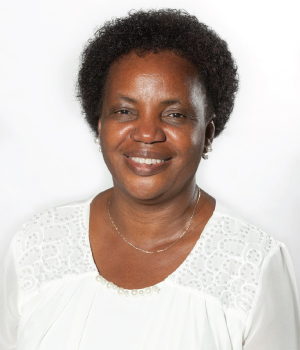
- The Zimbabwe Technical Assistance, Training & Education Center for Health (Zim-TTECH) joins the nation and the global community in celebrating World TB Day under the theme: Invest to End TB, Save lives
- With PEPFAR funding administered by the Centers for Disease Control and Prevention (CDC), Zim-TTECH provides comprehensive HIV and TB services in 5 provinces in the country, that is Mashonaland East, Mashonaland West, Mashonaland Central, Matabeleland North and Harare covering 390 health facilities in 20 districts. This is in support of the Ministry of Health and Child Care (MoHCC) strategy of ending the HIV and TB epidemics by 2030.
- .Zim-TTECH has been supporting provision of TB screening, diagnosis, and treatment services, integrated TB/HIV care and TB Preventive Therapy (TPT) for clients at risk of TB disease since 2013 as part of I-TECH Zimbabwe’s efforts in fighting HIV/AIDS.
- During this period Zim-TTECH celebrates national TB milestones achieved through contributing significantly to the national response of ending the TB epidemic through deployment of skilled health care workers and community health workers including TPT champions who are responsible for creating awareness on benefits of TPT. Additionally, ZimTTECH supports capacitation of health care workers to equip them with skills for offering quality TB services.
- ZimTTECH remains committed to ending the TB epidemic through building public awareness about TB, supporting roll out of newer point of care TB diagnostic tests, prompt initiation on treatment for those with TB disease and roll out of shorter TPT regimens.
